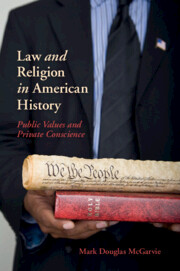Book contents
- Frontmatter
- Contents
- List of Illustrations
- Preface
- Acknowledgments
- Prologue: Colonial America Perpetuates State Religion
- 1 Revolution in Thought and Social Organization: The Legal Hegemony of Jeffersonian Liberalism, 1776–1828
- 2 A Christian Counter-revolution and a New Vision of American Society, 1828–1865
- 3 Regulating Behavior and Teaching Morals: The Uses of Religion, 1865–1937
- 4 The Rights Revolution, 1937–2015
- Epilogue: The Signifi cance of History and a Reconsideration of Original Intent
- Bibliographic Essay
- Index
Epilogue: The Signifi cance of History and a Reconsideration of Original Intent
Published online by Cambridge University Press: 05 July 2016
- Frontmatter
- Contents
- List of Illustrations
- Preface
- Acknowledgments
- Prologue: Colonial America Perpetuates State Religion
- 1 Revolution in Thought and Social Organization: The Legal Hegemony of Jeffersonian Liberalism, 1776–1828
- 2 A Christian Counter-revolution and a New Vision of American Society, 1828–1865
- 3 Regulating Behavior and Teaching Morals: The Uses of Religion, 1865–1937
- 4 The Rights Revolution, 1937–2015
- Epilogue: The Signifi cance of History and a Reconsideration of Original Intent
- Bibliographic Essay
- Index
Summary
The battle over the role of religion in American society forms the longest-running debate in the nation's history. Since the mid-1700s, it has pitted two opposing worldviews, humanism and Protestant Christianity, as competitors for the values, beliefs, and attitudes of the American people and the laws and institutions they create. The political battlegrounds over which law and religion have contested have seldom been over religion itself, focusing instead on morality or values. The conflict between law and religion generally has been expressed in Americans’ efforts to grapple with inequalities in wealth, limits on personal freedoms, and the powers of private associations and corporations. As a result, law's consideration of religion has been as much a matter of contract law, police powers, and corporate law as of the First Amendment.
In the recurring battles between Christian communitarians and secular individualists, the former have formed a series of alliances intended to advance their political causes. Whether fighting for disestablishment, abolition, Sabbath-day protection, prohibition, bans on abortion, or in the various movements for public recognition of Christianity, Christian activists have found momentary common cause with others who shared their immediate political goals, if not their long-term religious aspirations. Each of these movements has resulted in some degree of legal change, but never the total societal recognition of the Christian activists’ position. Still, the multiple legal changes have, over time, eaten away at the strict separation envisioned by the founders and the public-private distinction that was essential to creating it.
People struggle to maintain two inconsistent ideas simultaneously; so too must societies. American culture is rooted in two conflicting idea systems that can roughly be expressed as Enlightenment humanism and Christian moralism. For most of American history, certainly from the colonial era until the middle of the twentieth century, Christianity has been a voice of protest against individualism and its humanistic expressions in free-enterprise capitalism and democracy. To a large extent, the civil religion, at once both a betrayal of each idea system and an integration of the two, has allowed Americans to hold onto their inconsistent ideologies while largely ignoring their irreconcilability. Formed in the mid-nineteenth century in the heat of Christian activists’ crusade to reform America, it muted the ardent Christians’ communitarian challenge while lessening the harshness of liberalism.
- Type
- Chapter
- Information
- Law and Religion in American HistoryPublic Values and Private Conscience, pp. 193 - 198Publisher: Cambridge University PressPrint publication year: 2016



